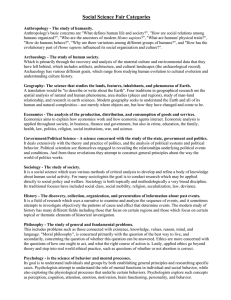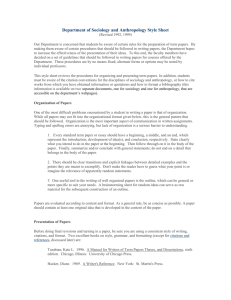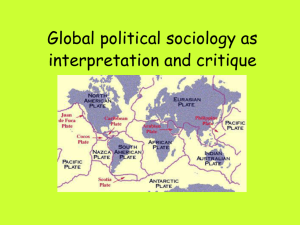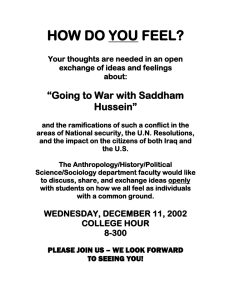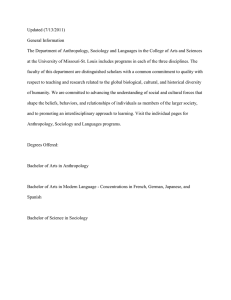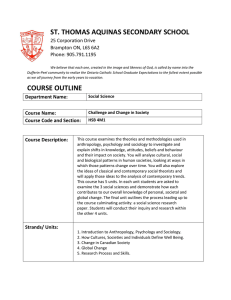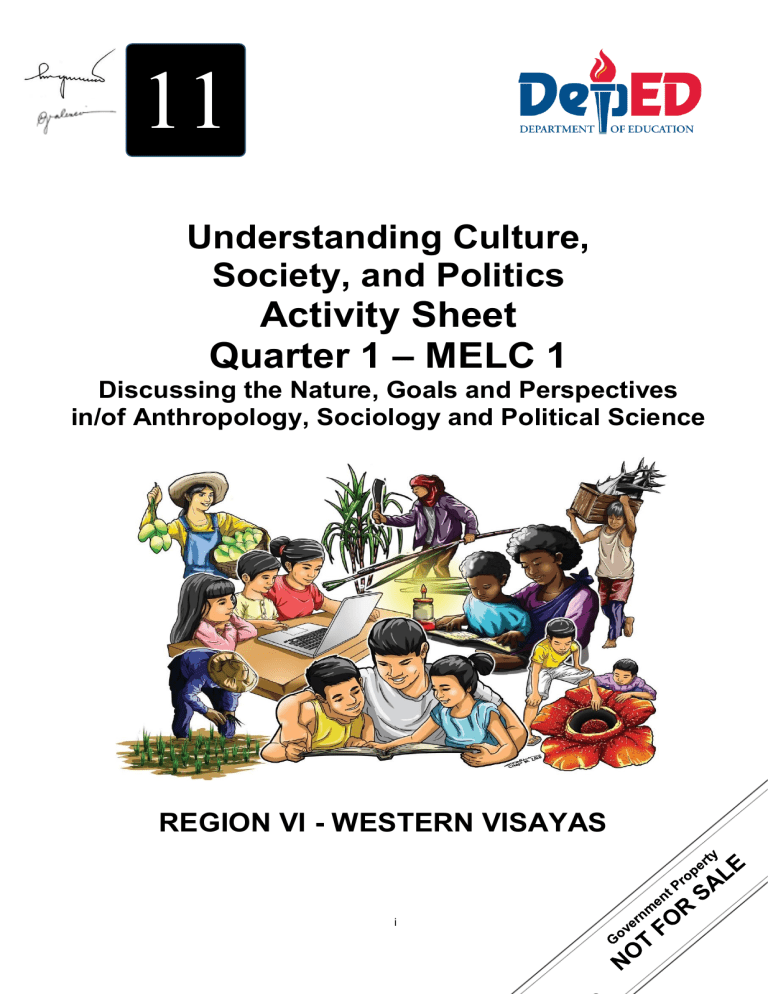
11 Understanding Culture, Society, and Politics Activity Sheet Quarter 1 – MELC 1 Discussing the Nature, Goals and Perspectives in/of Anthropology, Sociology and Political Science REGION VI - WESTERN VISAYAS i Understanding Culture, Society, and Politics 11 Learning Activity Sheet (LAS) 1 First Edition, 2020 Published in the Philippines By the Department of Education Region 6 - Western Visayas Duran St., Iloilo City Republic Act 8293, section 176 states that: No copyright shall subsist in any work of the Government of the Philippines. However, prior approval of the government agency or office wherein the work is created shall be necessary to exploitation of such work for profit. Such agency or office may, among other things, impose as a condition the payment of royalties. This Learning Activity Sheet (LAS) is developed by DepEd Region 6 Western Visayas. ALL RIGHTS RESERVED. No part of this learning resource may be reproduced or transmitted in any form or by any means electronic or mechanical without written permission from the DepEd Regional Office 6 – Western Visayas. Development Team of Understanding Culture, Society, and Politics 11 LAS Writer: Nestogyn S. Ilaya Illustrator: Hilda S. Salvilla Editors: Liberty P. Lego, Eric G. Buenafe Layout Artist: Jefferson B. Magbanua Schools Division Quality Assurance Team: Arlo L. Villalva, Leila G. Valencia, Jezereel Grace G. Tiron, Bernie P. Alcedo Division of Iloilo City Management Team: Ma. Luz M. de los Reyes Printed in the Philippines by _______________________________. Ernesto F. Servillon, Jr. Arlo L. Villalva Leila G. Valencia Liberty P. Lego Regional Management Team: Ma. Gemma M. Ledesma Josilyn S. Solana Elena P. Gonzaga Donald T. Genine Mary Hazel Vivien P. Pineda ii Introductory Message Welcome to Understanding Culture, Society, and Politics 11! The Learning Activity Sheet is a product of the collaborative efforts of the Schools Division of Iloilo City and DepEd Regional Office VI - Western Visayas through the Curriculum and Learning Management Division (CLMD). This is developed to guide the learning facilitators (teachers, parents and responsible adults) in helping the learners meet the standards set by the K to 12 Basic Education Curriculum. The Learning Activity Sheet is self-directed instructional materials aimed to guide the learners in accomplishing activities at their own pace and time using the contextualized resources in the community. This will also assist the learners in acquiring the lifelong learning skills, knowledge and attitudes for productivity and employment. For learning facilitator: The Understanding Culture, Society, and Politics 11 Activity Sheet will help you facilitate the teaching-learning activities specified in each Most Essential Learning Competency (MELC) with minimal or no face-to-face encounter between you and learner. This will be made available to the learners with the references/links to ease the independent learning. For the learner: The Understanding Culture, Society, and Politics 11 Activity Sheet is developed to help you continue learning even if you are not in school. This learning material provides you with meaningful and engaging activities for independent learning. Being an active learner, carefully read and understand the instructions then perform the activities and answer the assessments. This will be returned to your facilitator on the agreed schedule. iii Quarter 1, Week 1 Learning Activity Sheet (LAS) No. 1 Name of Learner:________________________ Grade and Section:__________ Date: ______________ UNDERSTANDING CULTURE, SOCIETY, AND POLITICS ACTIVITY SHEET Discussing the Nature, Goals and Perspectives in/of Anthropology, Sociology and Political Science I. Learning Competency 1. Discuss the nature, goals and perspectives in/of Anthropology, Sociology and Political Science. II. Background Information for Learners Social Science is the discipline under which identity, culture, society, and politics are studied. It is comprised of disciplines that study the overall function of a society, as well as the interactions among individual members of an institution. Anthropology, Sociology, and Political Science are among the disciplines under Social Science. According to 18th Century English anthropologist Edward B. Taylor, Anthropology is a behavioral science that deals with the study of culture - its components, characteristics, functions, modes of adaptation, cultural values, and practices. Culture is a complex whole which encompasses the beliefs, practices, values, attitudes, norms, artifacts, symbols, knowledge, and everything that a person learns and shares as a member of society. Sociology is a behavioral science that deals with the study of society - its origin, evolution, characteristics, dimensions, and basic social functions. Society is a group of people living together in a definite territory, having a sense of belongingness, mutually interdependent of each other, and follows a certain way of life. On the other hand, Political Science deals with the study of politics or government. It also dwells on the study of the foundations of the state and the principles of government. Political Science examines the way people govern themselves, the various forms of government, their structures, and their relationships to other institutions. Politics involves a set of activities that are associated with making decisions in groups or other forms of power relations between individuals, such as the distribution of resources or statuses. There are activities provided for the learners to help them in grasping thoroughly the concepts of Anthropology, Sociology, and Political Science, particularly their natures, goals, and perspectives. Page 1 III. Accompanying DepEd Textbook and Educational Sites Ariola, M. (2016). Understanding Culture, Society, and Politics. USCP Module, Division of Negros Occidental IV. Activity Proper Activity 1. Sentence Completion Directions: Complete the statement to give meaning and sense to such by choosing the appropriate word enclosed inside the parenthesis. Write your answers on a separate paper. 1. Sociology is specifically significant because it regulates and controls people’s (life, behaviour, religion). 2. Politics can (enhance, destroy, obstruct) personal happiness. 3. Politics affects human (biology, lives, society). 4. Anthropology is (stereotype, relevant, commentary). 5. Political Science trains students to develop (symbiotic, critical, simple) skills. 6. Studying Sociology is a (confirmative, supportive, transformative) experience. 7. (Sociology, Anthropology, Political Science) increases our understanding of ourselves and our society. 8. Sociology tells us that health is a (political, cultural, human) right. 9. Sociology is produced because of (personal, social, real) change. 10. Culture is the (visible, invisible, discernible) bond. Activity 2. Picture Analysis Directions: Using the pictures presented below, discuss their concepts by writing an essay comprised of 50 words per topic. Write your answers on a separate sheet of paper. A B C Page 2 Activity 3. Think and Reflect Directions: Discuss the following questions on the basis of your understanding of culture, society, and politics to enhance and extend your knowledge in our topic. Write your answers on a separate sheet of paper. 1. Why do you think is this subject/ course offered to Senior High School students? ________________________________________________________________ ________________________________________________________________ ________________________________________________________________ 2. Is it important for you to know the concepts of culture, society, and politics? Why? ________________________________________________________________ ________________________________________________________________ ________________________________________________________________ 3. As a student, how can Anthropology, Sociology and Political Science help you in your day-to-day living? ________________________________________________________________ ________________________________________________________________ ________________________________________________________________ Page 3 Rubric for Rating Essays RATING SCALE FOCUS The single controlling point made with an awareness of task about a specific topic. CONTENT The presence of ideas developed through facts, examples, anecdotes, details, opinions, statistics, reasons and/or explanations. ORGANIZATION The order developed and sustained within and across paragraphs using transitional devices and including introduction and conclusion. Sophisticated arrangement of content with evident and/or subtle transitions 4 Sharp, distinct controlling point made about a single topic with evident of awareness of task. Substantial, specific or illustrative content demonstrating strong development and sophisticated ideas 3 Apparent point made about a single topic with sufficient awareness of task. Sufficiently developed content with adequate elaboration or explanation Functional arrangement of content that sustains a logical order with some evidence of transitions 2 No apparent point but evidence of a specific topic Limited content with inadequate elaboration or explanation Confused or inconsistent arrangement of content with or without attempts of transition 1 Minimal evidence of a topic Superficial and/or minimal content Minimal control of content arrangement STYLE The choice, use and arrangement of words and sentence structures that create tone and voice. CONVENTIONS Grammar, mechanics, spelling, usage and sentence formation. Precise, illustrative use of a variety of words and sentence structures to create consistent writer’s voice and tone appropriate to the audience/ reader. Generic use of a variety of words and sentence structures that may or may not create writer’s voice and tone appropriate to the audience Limited word choice and control of sentence structures that inhibit voice and tone Minimal variety in word choice and minimal control of sentence structures Evident control of grammar, mechanics, spelling, usage and sentence formation Sufficient control of grammar, mechanics, spelling, usage and sentence formation Limited control of grammar, mechanics, spelling, usage and sentence formation Minimal control of grammar, mechanics, spelling, usage and sentence formation Page 4 Remember Sociology, Anthropology, and Political Science complement each other in showing different facets of how humans structure their societies. Sociology investigates average social behaviors of people while political science focuses on certain areas of society like laws, policies, governments, and other such customs. Anthropology is a wideranging field that covers some of the above topics as well as the biology and psychology of humans. Together, these three disciplines can depict how human societies operate individually and with each other. V. Reflection Directions: Supply the appropriate words to complete the thought of each phrase below. Write your answers on a separate paper. I have learned that culture, society and politics are ________________________________________________________________ ________________________________________________________________ I realized that the goals of Anthropology, Sociology and Political Science are ________________________________________________________________ ________________________________________________________________ Studying the culture, society and politics is important because ________________________________________________________________ ________________________________________________________________ VI. Answer Key * Reflection Answers may vary. * Activity 3. Think and Reflect Answers may vary. * Activity 2. Picture Analysis Answers may vary. * Activity 1. Sentence Completion 1. Behavior 2. Enhance 3. Lives 4. Relevant 5. Critical 6. Transformative 7. Sociology 8. Human 9. Social 10. Invisible Page 5
